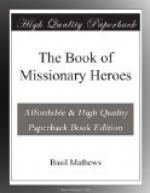The great heroes and heroines whose story is told in this book have run across the centuries over the world to us. Some of them are alive to-day, as heroic as those who have gone. But all of them say the same thing to us of the new world who are coming after them:
“Take the torch.”
The greatest of them all, when he came to the very end of his days, as he fell and passed on the Torch to others, said:
“I have run my course.”
But to us who are coming on as Torch-bearers after him he spoke in urgent words—written to the people at Corinth where the Isthmian races were run:
“Do you not know that they which
run in a race all run, but one wins
the prize?
So run, that ye may be victors.”
FOOTNOTES:
[Footnote 1: See “The Argonauts of Faith” by Basil Mathews. (Doran.)]
Book One: THE PIONEERS
CHAPTER I
THE HERO OF THE LONG TRAIL
St. Paul
(Dates, b. A.D. 6, d. A.D. 67[2])
The Three Comrades.
The purple shadows of three men moved ahead of them on the tawny stones of the Roman road on the high plateau of Asia Minor one bright, fresh morning.[3] They had just come out under the arched gateway through the thick walls of the Roman city of Antioch-in-Pisidia. The great aqueduct of stone that brought the water to the city from the mountains on their right[4] looked like a string of giant camels turned to stone.
Of the three men, one was little more than a boy. He had the oval face of his Greek father and the glossy dark hair of his Jewish mother. The older men, whose long tunics were caught up under their girdles to give their legs free play in walking, were brown, grizzled, sturdy travellers. They had walked a hundred leagues together from the hot plains of Syria, through the snow-swept passes of the Taurus mountains, and over the sun-scorched levels of the high plateau.[5] Their muscles were as tireless as whipcord. Their courage had not quailed before robber or blizzard, the night yells of the hyena or the stones of angry mobs.
For the youth this was his first adventure out into the glorious, unknown world. He was on the open road with the glow of the sun on his cheek and the sting of the breeze in his face; a strong staff in his hand; with his wallet stuffed with food—cheese, olives, and some flat slabs of bread; and by his side his own great hero, Paul. Their sandals rang on the stone pavement of the road which ran straight as a strung bowline from the city, Antioch-in-Pisidia, away to the west. The boy carried over his shoulder the cloak of Paul, and carried that cloak as though it had been the royal purple garment of the Roman Emperor himself instead of the worn, faded, travel-stained cloak of a wandering tent-maker.




